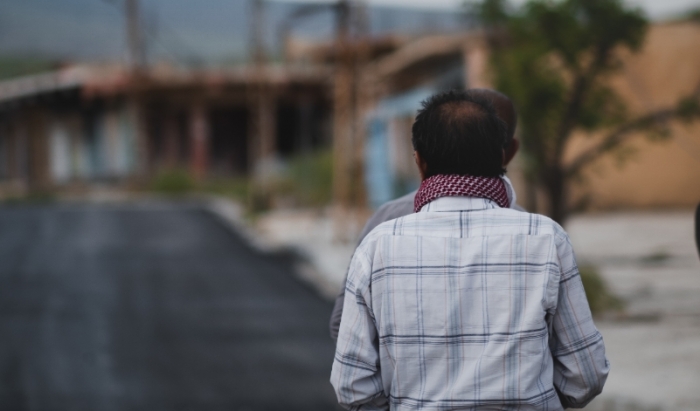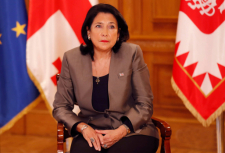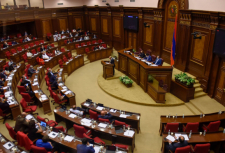Will IS fighters face an international court in Iraq?

Calls for an international tribunal to prosecute “Islamic State” fighters are growing louder ahead of an EU meeting. European states, including Germany, refuse to bring some of their citizens-turned-militants home.
Swedish politicians are some of the most vocal supporters of a special tribunal to try individuals who have committed crimes as members of the so-called Islamic State (IS). Sweden’s interior minister, Mikael Damberg, recommends the quick creation of such a court.
“There should not be impunity for murder, terrorist crimes, war crimes or crimes against humanity,” Damberg said in Stockholm at a conference for experts from various European countries. He included other war criminals in Syria and Iraq in this category: “This applies to all parties in the conflict,” he said.
Damberg did not specify the location of the potential court but said it would be in the region of Syria and Iraq. The interior ministers from EU nations are set to meet Friday in Luxembourg to further discuss the issue.
Chaotic conditions in camps for IS fighters’ relatives
Following the military victory over IS, Syria and Iraq have been holding tens of thousands of former IS fighters and their family members in prisons and camps under abject conditions. Television reports over the past weeks have shown startling images: Women fully veiled in black and children, including many orphans, idling miserably in temperatures around 45 C (113 F). Overheated tents make sleep nearly impossible. Syrians, Kurds and Iraqis would like to send those who hail from Europe back to their home countries. But most European nations, including Germany, are trying to keep these citizens at a distance, since many are considered to be highly dangerous.
500 prisoners from Germany
In the past years, more than 1,000 men and women from Germany alone joined IS in Syria and Iraq. Every fifth person died there, while every third person has already gone back to Germany. Some 500 are waiting behind bars and fences to return to Germany; most of them are German citizens. German security officials consider just over 20 individuals to be potential terrorists, who pose a threat to public safety.
They argue it is too dangerous politically to bring them back to Germany. The complex investigations German intelligence agencies have to undertake in Syria and Iraq complicate criminal prosecution, meaning that many of these Islamic fighters could only be sentenced to short prison terms — if at all.
Constitutional lawyers see no problem
The prominent German constitutional lawyer Rupert Scholz therefore sees no problems with establishing a new independent international tribunal under certain conditions. Scholz, also a former government minister for the conservative Christian Democrats (CDU), told DW that the court must “be built on the model of the International Criminal Court in The Hague.”
He added that prerequisites include an agreement between Iraq and EU member nations based on public international law that would exclude the death penalty as a possible sentence. Scholz said the judges should come from Iraq and the home states of IS fighters.
Scholz sees many clear advantages; it would be much easier for a tribunal in Iraq to gather evidence, move investigations forward and question witnesses than it would be for a court located elsewhere. The Iraqi government also has an interest in sentencing the foreign Islamic fighters that killed many Iraqi citizens. The government in Baghdad is already offering to build a new prison for 2,000 IS criminals at a cost of $100 million (€83 million).
According to the German daily Die Welt, the German government is open to discussing the proposed special tribunal under the precondition that it be thoroughly reviewed by the international community.
Even Germany’s most left-wing opposition party, The Left party, did not fundamentally reject an international court, though it did voice a preference for court proceedings to take place on German soil.
Ulla Jelpke, The Left Party’s expert for domestic and legal affairs, told DW: “Germans who have committed crimes should have to answer for them in Germany.” Jelpke added that a tribunal in Iraq would be “only the second-best solution,” since an international court would relieve the Islamic fighters’ home states of part of their responsibility, she claimed.
ezidi24.com
Tags:
Will IS fighters face an international court in Iraq?

Calls for an international tribunal to prosecute “Islamic State” fighters are growing louder ahead of an EU meeting. European states, including Germany, refuse to bring some of their citizens-turned-militants home.
Swedish politicians are some of the most vocal supporters of a special tribunal to try individuals who have committed crimes as members of the so-called Islamic State (IS). Sweden’s interior minister, Mikael Damberg, recommends the quick creation of such a court.
“There should not be impunity for murder, terrorist crimes, war crimes or crimes against humanity,” Damberg said in Stockholm at a conference for experts from various European countries. He included other war criminals in Syria and Iraq in this category: “This applies to all parties in the conflict,” he said.
Damberg did not specify the location of the potential court but said it would be in the region of Syria and Iraq. The interior ministers from EU nations are set to meet Friday in Luxembourg to further discuss the issue.
Chaotic conditions in camps for IS fighters’ relatives
Following the military victory over IS, Syria and Iraq have been holding tens of thousands of former IS fighters and their family members in prisons and camps under abject conditions. Television reports over the past weeks have shown startling images: Women fully veiled in black and children, including many orphans, idling miserably in temperatures around 45 C (113 F). Overheated tents make sleep nearly impossible. Syrians, Kurds and Iraqis would like to send those who hail from Europe back to their home countries. But most European nations, including Germany, are trying to keep these citizens at a distance, since many are considered to be highly dangerous.
500 prisoners from Germany
In the past years, more than 1,000 men and women from Germany alone joined IS in Syria and Iraq. Every fifth person died there, while every third person has already gone back to Germany. Some 500 are waiting behind bars and fences to return to Germany; most of them are German citizens. German security officials consider just over 20 individuals to be potential terrorists, who pose a threat to public safety.
They argue it is too dangerous politically to bring them back to Germany. The complex investigations German intelligence agencies have to undertake in Syria and Iraq complicate criminal prosecution, meaning that many of these Islamic fighters could only be sentenced to short prison terms — if at all.
Constitutional lawyers see no problem
The prominent German constitutional lawyer Rupert Scholz therefore sees no problems with establishing a new independent international tribunal under certain conditions. Scholz, also a former government minister for the conservative Christian Democrats (CDU), told DW that the court must “be built on the model of the International Criminal Court in The Hague.”
He added that prerequisites include an agreement between Iraq and EU member nations based on public international law that would exclude the death penalty as a possible sentence. Scholz said the judges should come from Iraq and the home states of IS fighters.
Scholz sees many clear advantages; it would be much easier for a tribunal in Iraq to gather evidence, move investigations forward and question witnesses than it would be for a court located elsewhere. The Iraqi government also has an interest in sentencing the foreign Islamic fighters that killed many Iraqi citizens. The government in Baghdad is already offering to build a new prison for 2,000 IS criminals at a cost of $100 million (€83 million).
According to the German daily Die Welt, the German government is open to discussing the proposed special tribunal under the precondition that it be thoroughly reviewed by the international community.
Even Germany’s most left-wing opposition party, The Left party, did not fundamentally reject an international court, though it did voice a preference for court proceedings to take place on German soil.
Ulla Jelpke, The Left Party’s expert for domestic and legal affairs, told DW: “Germans who have committed crimes should have to answer for them in Germany.” Jelpke added that a tribunal in Iraq would be “only the second-best solution,” since an international court would relieve the Islamic fighters’ home states of part of their responsibility, she claimed.
ezidi24.com
Tags:

























